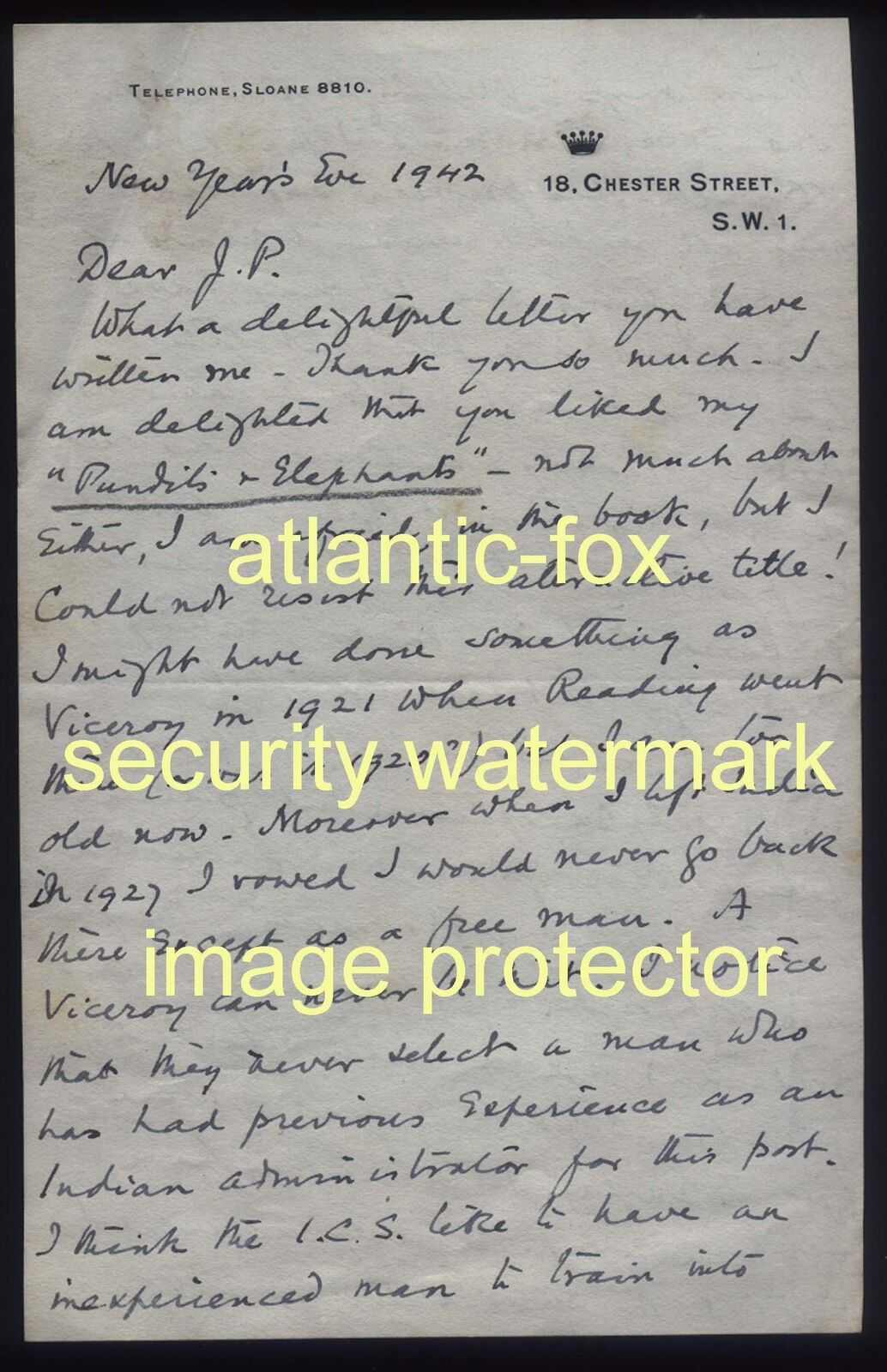-40%
1942; 2nd Earl of Lytton, Gov of Bengal, Act,VICEROY, Author PUNDITS & ELEPHANTS
$ 175.95
- Description
- Size Guide
Description
1942; 2nd Earl of Lytton, Gov of Bengal, Act,VICEROY, Author PUNDITS & ELEPHANTSThis product data sheet is originally written in English.
1942; A Fine letter of 4 pages on his letter headed paper, 18 Chester Street, S.W.1, addressed to Dear J.P. (Major- general Sir John Ponsonby) in which he talks about his time in India and his book "PUNDITS & ELEPHANTS".
Fresh to the Market Place, from Major-General Sir John Ponsonby's Collection recently purchased by us, and until now, had remained in the possession of Sir John's descendants.
For more from this collection see our shop category for SIR JOHN PONSONBY COLLECTION
John Ponsonby (British Army officer)From Wikipedia, the free encyclopedia
Major-General Sir John Ponsonby KCB CMG DSO (25 March 1866 – 26 March 1952) was a British Army officer who commanded 5th Division during World War I
Born the son of Sir Henry Ponsonby (Queen Victoria's Private Secretary), his Mother Hon. Mary Elizabeth Ponsonby, Maid of Honour to Queen Victoria and a daughter of John Crocker Bulteel.
His brothers were Frederick Ponsonby, ( Assistant Private Secretary to Edward VII & GV), and Arthur Augustus William Harry Ponsonby, 1st Baron Ponsonby of Shulbrede, (British politician, writer, and social activist).
Sir John was educated at Eton College, He was gazetted to the Royal Irish Rifles 16 November 1887, and to the Coldstream Guards 15 August 1888, becoming Lieutenant 29 June 1891. He was ADC to the Governor and Commander-in-Chief, South Africa, 10 August 1891 to 30 January 1895; served in operations in Matabeleland (Medal); was promoted to Captain 7 September 1898, and in that year served in Uganda (Medal), and again in 1899, during the operations against Kabarega (clasp). Captain Ponsonby served in the South African War, 1899-1902, on special service with the Rhodesian Field Force, 19 February 1900 to 7 July 1901. He was Adjutant, 5th New Zealand Regiment, 8 June 1900 to 1 January 1901; afterwards in command 1 January to 18 January 1901. From February to May 1900, be was employed with Mounted Infantry, and he took part in operations in the Transvaal, west of Pretoria, from July to 29 November 1900; operations in the Transvaal, February to June 1901; operations in Cape Colony, February to 31 May 1902. He was mentioned in Despatches [London Gazette, 10 September 1901]; received the Queen's Medal with four clasps, the King's Medal with two clasps, and was created a Companion of the Distinguished Service Order [London Gazette, 27 September 1901]: "John Ponsonby, Captain, Coldstream Guards. In recognition of services during the operations in South Africa". The Insignia were presented by the King 27 October 1901. He was promoted to Major 23 January 1904, and commanded the Guards' Depot 1 March 1905 to 28 February 1907. He became Lieutenant Colonel 28 October 1913. Lieutenant Colonel Ponsonby served in the European War, 1914—18; commanded the 2nd Guards Brigade, BEF, 26 August 1915 to 19 November 1916: was given the Brevet of Colonel 1 January 1916; commanded the Special Reserve Infantry Brigade 28 November 1916 to 7 March 1917; commanded the 21st Infantry Brigade, BEF, 8 March to 20 March 1917; became Colonel 20 March 1917; commanded the 2nd Guards Brigade, British Armies in France, 21 March to 21 August 1917; commanded the 40th Division, British Armies in France, 22 August 1917 to 3 July 1918; subsequently commanded the 5th Division, British Armies in France, 4 July 1918 to 1 April 1919; was promoted to Major General 1 January 1919. He was mentioned in Despatches; created a CMG in 1915, a CB in 1918, and was given the Brevet of Colonel.
He went on to become General Officer Commanding 5th Division remaining in that role until the end of the War. After the War he became General Officer Commanding the Madras District of India. He retired in 1928.
He lived at Haile Hall near Beckermet in Cumbria
Victor Alexander George Robert Bulwer-Lytton, 2nd Earl of Lytton, KG, GCSI, GCIE, PC, DL (9 August 1876 – 25 October 1947),
styled Viscount Knebworth from 1880 to 1891, was a British politician and colonial administrator. He served as Governor of Bengal between 1922 and 1927 and was briefly Acting Viceroy of India in 1926. He headed the Lytton Commission for the League of Nations, in 1931-32, producing the Lytton Report which condemned Japanese aggression against China in Manchuria.
Lytton was the fourth but eldest surviving son of Robert Bulwer-Lytton, 1st Earl of Lytton and Edith Villiers, daughter of Edward Ernest Villiers and granddaughter of George Villiers. He was born in Simla in British India, during the time when his father was Viceroy of India. He was educated at Eton and Trinity College, Cambridge,[1] where he was secretary of the University Pitt Club.[2] In 1905 he was President of the Edinburgh Sir Walter Scott Club and gave the Toast to Sir Walter at the club's annual dinner.
Victor Bulwer-Lytton's six siblings were :
Edward Rowland John Bulwer-Lytton (1865–1871)
Lady Elizabeth Edith "Betty" Bulwer-Lytton (12 June 1867 – 28 March 1942). Married Gerald Balfour, 2nd Earl of Balfour, brother of the future Prime Minister Arthur Balfour.
Lady Constance Bulwer-Lytton (1869-1923) Prominent suffragette
Henry Meredith Edward Bulwer-Lytton (1872–1874)
Lady Emily Bulwer-Lytton (1874–1964). Married the architect Edwin Lutyens. Associate and confidante of Jiddu Krishnamurti.
Neville Bulwer-Lytton, 3rd Earl of Lytton (6 February 1879 – 9 February 1951
Lytton started off his official career by filling up various posts in the Admiralty between 1916 and 1920, before being appointed Under-Secretary of State for India, a post which he held between 1920 and 1922. He was also made a Privy Counsellor in 1919. On 16 February 1922 he was posted as Governor of Bengal,[3][4] remaining there until 3 March 1927.[5][6] For a short while, when there was a vacancy caused by change in incumbents in 1926, he also functioned as Viceroy, his father's old post. After this he filled miscellaneous positions in various capacities, when matters concerning India came up. He wrote two books, the first being a life of his grandfather Lord Lytton,
while the other book dealt with his experiences in India and was called "Pundits and Elephants"
, published in 1942
. He was made a Knight of the Garter in 1933.
Lytton is best known for his chairmanship of the Lytton Commission, which was sent by the League of Nations on a fact-finding mission to determine who was to blame in the 1931 war between Japan and China. The commission's Lytton Report, officially issued on 1 October 1932, blames Japanese aggression. In response Japan withdrew from the League of Nations.
Lord Lytton married at St Margaret's, Westminster, on 3 April 1902, Pamela Chichele-Plowden, daughter of Sir Trevor Chichele Plowden. She had been an early flame of Winston Churchill, but that relationship was amicably broken off when she decided to marry Lytton instead.
The couple had two sons, both of whom predeceased Lytton. The elder son, Antony Bulwer-Lytton, Viscount Knebworth, MP, died aged 30 in an air crash while serving with the Auxiliary Air Force. The younger son, Alexander Edward John Bulwer-Lytton, Viscount Knebworth, MBE, was killed in the Second Battle of El Alamein during World War II.
As neither of his sons had left a son, Lytton's titles were inherited upon his death by his younger brother Neville Bulwer-Lytton. Knebworth House passed to his daughter Lady Hermione Cobbold, wife of future Governor of the Bank of England and Lord Chamberlain Cameron Fromanteel Cobbold.
Victor Bulwer-Lytton, 2nd Earl of Lytton died in October 1947, aged 71
:
Powered by SixBit's eCommerce Solution
1942; A Fine letter of 4 pages on his letter headed paper, 18 Chester Street, S.W.1, addressed to Dear J.P. (Major- general Sir John Ponsonby) in which he talks about his time in India and his book "PUNDITS & ELEPHANTS". Fresh to the Market Place, from Major-General Sir John Ponsonby's Collection recently purchased by us, and until now, had remained in the possession of Sir John's descendants.For more from this collection see our shop category for SIR JOHN PONSONBY COLLECTION John Ponsonby (British Army officer)From Wikipedia, the free encyclopediaMajor-General Sir John Ponsonby KCB CMG DSO (25 March 1866 – 26 March 1952) was a British Army officer who commanded 5th Division during World War IBorn the son of Sir Henry Ponsonby (Queen Victoria's Private Secretary), his Mother Hon. Mary Eli
EAN
Does Not apply
Famous Persons in history
Victor Bulwer-Lytton
Era
1901-1950
City/Town/Village/Place
London
Related Interests
Author of Pundits & Elephants












